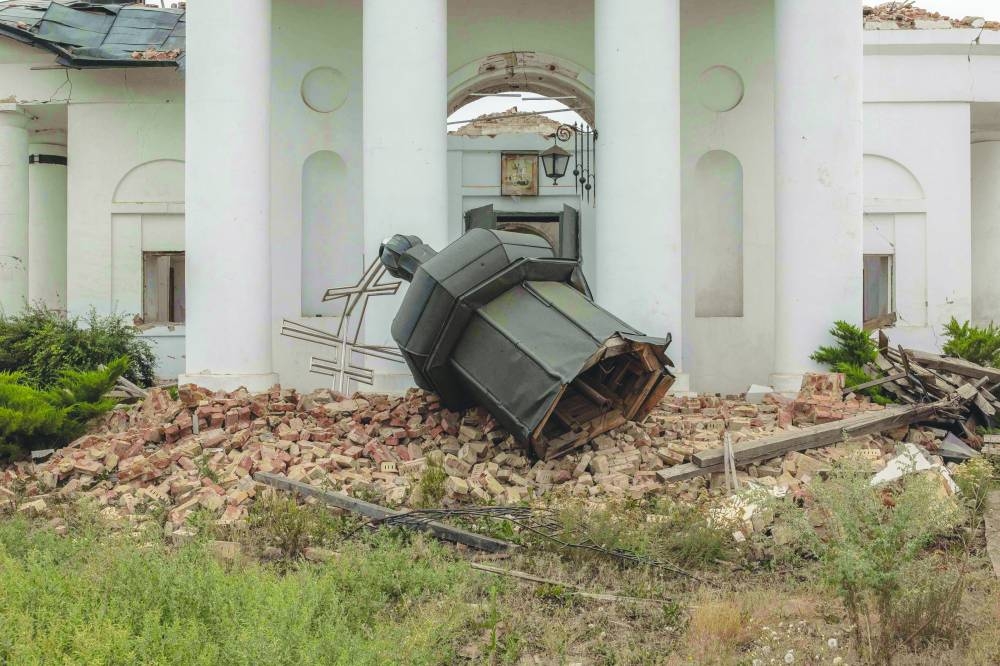NovogrodivkaThe first artillery shell hit just before the priest started his Sunday service, screeching over cowering Orthodox worshippers and exploding into a bloc of Soviet-era flats.
It confirmed to Angela that she was making the right decision to flee her hometown of Novogrodivka, a sleepy mining settlement whose panicked residents increasingly fear a Russian takeover.
“We’re leaving and we’re probably never coming back,” said the 53-year-old, wearing a blue headscarf and clutching a walking stick.
“Better to go than to be dead,” she told AFP tearfully shortly before racing home from the church in the town that was once home to 14,000 people.
She drove past wrecked flats and a terrified woman in pyjamas clutching her dog only to learn a second shell had hit her own building where her ailing husband was sheltering.
Leaking gas and concrete dust hung in the air, dislodged apricots lay beneath sun-baked trees. A realisation that the ground was shifting in the Donetsk region was written on the startled faces of onlookers.
Despite a Ukrainian offensive in Russia’s border region of Kursk, towns and villages across eastern Ukraine have been falling to Russian forces along an increasingly precarious front.
The mounting fear is that exhausted and outgunned Ukrainian troops will not stop Russian advances.
“The next couple of weeks are going to be critical,” said Franz-Stefan Gady, a military analyst with the London-based International Institute for Strategic Studies.
“The Russians are going to try everything to push the Ukrainians and seize as much territory as they can because they know that the time window is closing for them to make gains.”
Anticipating advances, Ukrainian authorities have ordered the evacuation of children from threatened villages — including Novogrodivka.
Several military, who spoke on the condition of anonymity to candidly discuss the battlefield, said the short-term outlook was bleak, particularly around Pokrovsk, a railway hub in the Donetsk region, 15km from Russian positions.
“Right now, it doesn’t look like it will hold,” one told AFP.
The industrial Donbas region has long been a Kremlin target.
A decade ago, President Vladimir Putin fostered a rebellion by separatists who seized swathes of territory in battles that cost thousands of lives.
After failing to capture the capital Kyiv with its February 2022 invasion, Russia set its sights on wresting all of Donbas, Ukraine’s mining heartland.
In a recent interview with AFP, President Volodymyr Zelensky conceded his forces could only halt Russia in Donbas if they had more weapons, more men, and fewer restrictions on the use of Western-supplied missiles inside Russia.
He said Ukraine had aimed to ready more than a dozen new brigades and some would reach the front soon but implied few were fully equipped.
“Can we stop them if only three are ready?”
In the village of Kleban-Byk, with plumes of smoke rising from battles in another flashpoint city, Toretsk, Olena Semykina was betting Ukrainian forces could not.
The 43-year-old’s daughter was wounded in a recent strike and she estimated she could keep her shop open for another week — two at best — before her own life was in danger.
“The war, the front line is approaching, and people are leaving. Children have already been forcibly evacuated,” she told AFP. She sent her daughter to Kharkiv, another region where Russian forces have gained territory.
Hers was the last open shop in the area and those unable or unwilling to leave needed somewhere to buy basics, she said, moments after a shell screamed overhead, sending bystanders ducking for cover.
Russian advances are coming at a high cost for Moscow.
The British defence ministry has said Moscow is losing around 1,000 troops every day, figures echoed by Zelensky in the interview last month.
And even though Russia is likely to make gains in coming weeks, military analysts and Ukrainian officials believe Moscow cannot collapse Ukrainian defensive lines.
“At some point, the Russians will have to slow down this pace of operations,” said Gady, the analyst, citing Russian manpower and artillery shortages, as well as their apparent inability to coordinate at key sectors across the front.
And with the opening of a new front inside Russia, the Kremlin could be forced to move some forces or slow its Donbas assaults.
Moreover, Gady said Ukraine had received vital consignments of artillery shells after delays in US aid and newly mobilised recruits would soon help rebuff any decisive Russian push.
“The real question is when the front will stabilise and where exactly it will stabilise,” he added.
Staring up at the bombed university where she used to work in Pokrovsk, 64-year-old Olga Borodich, feared the worst was yet to come.
“It will be bad. In our hearts we want everything to be OK, but in our heads we know that nothing good is coming,” she told AFP.

Saint George Church destroyed from shelling, in the village of Oleksandro-Shultyne, in eastern Donetsk region. (AFP)
